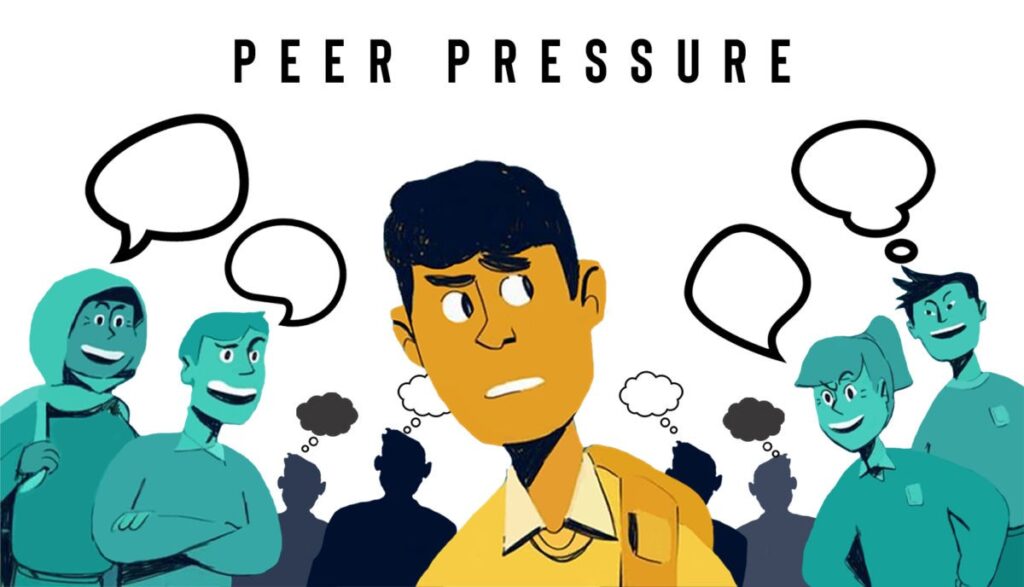Many of us feel peer pressured on the daily. Pressured to act a certain way, talk a certain way, have certain opinions, and buy things that we might not necessarily need or enjoy. It’s a trap we’ve all fallen into, but is buying a new trendy bag you feel pressured to own the same as feeling pressured to engage in potentially dangerous or uncomfortable activities?
How does this pressure affect our mental health? how many of these negative feelings that we sweep under the rug accumulate until we eventually burst? While peer pressure is relevant at all ages and in all situations, it is particularly at it’s peek during high school when we are still impressionable and just the right amount of insecure to be pressured to follow the lead of others.
Social Peer Pressure

We can fall victim to social peer pressure when we feel socially anxious that we might not fit in unless we follow a certain set of rules or act a certain way. This is especially prevalent during our high school years when our psychological need to fit in is at its prime, and the bullying of those who don’t necessarily fit into the socially accepted norm is enough to make us conform to the pressure.
It’s a slippery slope. Changing our behavior to fit in will give us the satisfaction of feeling like we belong at the expense of our comfort and true desires, while not succumbing to the pressure will give us the freedom of being ourselves at the expense of feeling accepted. To navigate this we suggest that you know when to draw the line, and assess how harmful the behavior you’re partaking in is to your wellbeing. Yes, buying the new trendy designer bag that you can’t afford might hurt your wallet, but drinking or doing drugs will hurt you physically, mentally, and potentially even your career.
Academic Peer Pressure

We know what it feels like to compare yourself to others in class and feel like you’re not good enough, not smart enough, not talented enough. This can have horrific implications on your mental health, you can fall victim to depression and anxiety, and find yourself lacking in motivation and drive, which can push you further down this rabbit hole.
It’s important to know that not everyone is born with the same abilities and talents, and that even if you might be lacking in one area, trust that you are gifted in another and choose to nurture and grow that. This is why we want to highlight how important it is to not compare yourself to other people, and not measure your progress based on theirs. What matters the most is that you’re doing better than you were before, because grades don’t define you, your continuous efforts and persistence do.
Familial Pressures

We know that sometimes peer pressure can come from your family members as well, not just your high school mates. The pressure to get into a top college because your cousin who you haven’t seen since you were 10 got a fully funded scholarship, the pressure to do well in math because your older brother was a straight A student, or the pressure to excel at football just because your dad was the captain of his team at your age.
The pressure to live up to your parent’s expectations can be daunting and take a heavy toll on your mental health, so it’s important to know that no matter what, at the end of the day it is your life, and pleasing your family should not come at the expense of your future happiness and wellbeing. Before you try to make anyone else proud, make sure that when you look at yourself in the mirror, you are proud of the person you see.
Positive Peer Pressure?

Did you know that peer pressure can be positive? positive peer pressure exists in various forms that you might not have been previously aware of, which is why it’s important to pay attention to who you surround yourself with, which we hope is a solid group of friends with values and attitudes that align with your own or what you aspire to be.
Say one of your goals is to be more environmentally friendly, joining a social circle where sustainability is a lifestyle will pressure you (in a positive way) to make these habits a part of your daily routine. For example, you might feel like you’re obligated to go to the weekly Nile cleanups, or to use paper straws instead of plastic ones because you don’t want to be the odd one out.
How Can You Help?
Although we cannot completely get rid of peer pressure, there are some ways by which we can help, some of which are internal and others that are related to how you act externally. Internally, it’s important to develop a strong sense of self and figure out who you are, what you like or dislike, and build enough self confidence that you are not swayed by what other people think you should be.
Externally, we should always try to create an accepting and safe environment for our friends and the people around us, so that they don’t feel like they are pressured to act a certain way. As previously discussed, the primary driver behind our conformity to peer pressure is our desire to fit in and belong, when we provide this sense of belonging and acceptance for people as they already are, there is no longer a need or pressure to conform.
